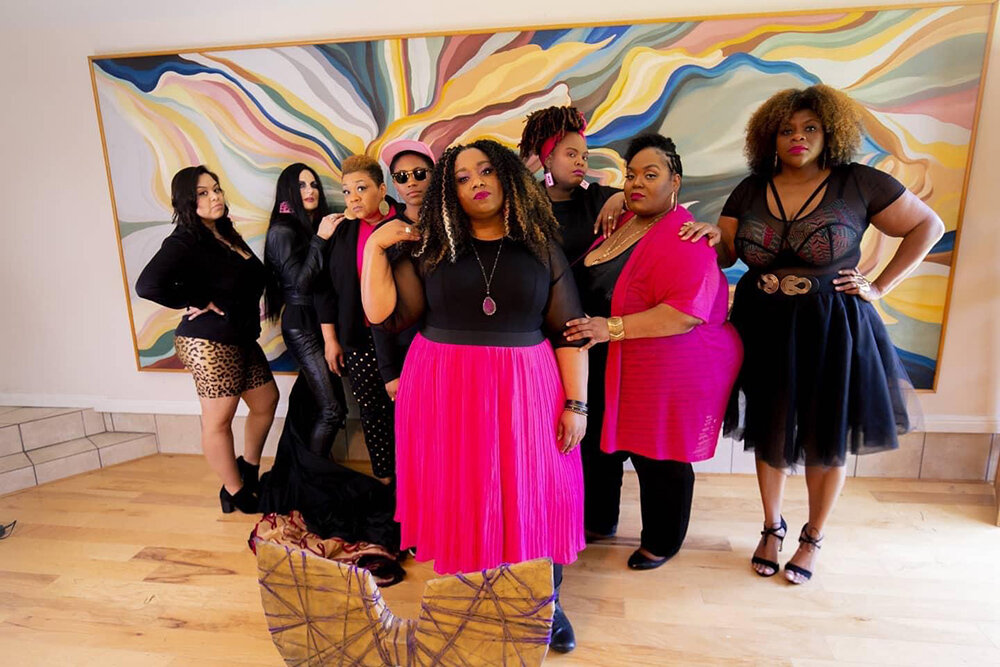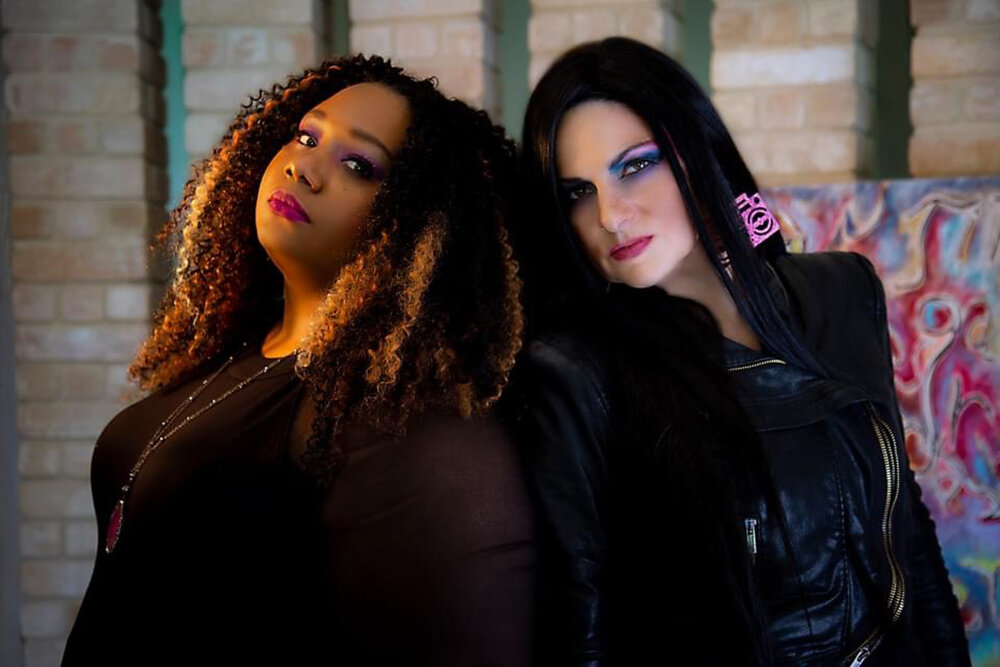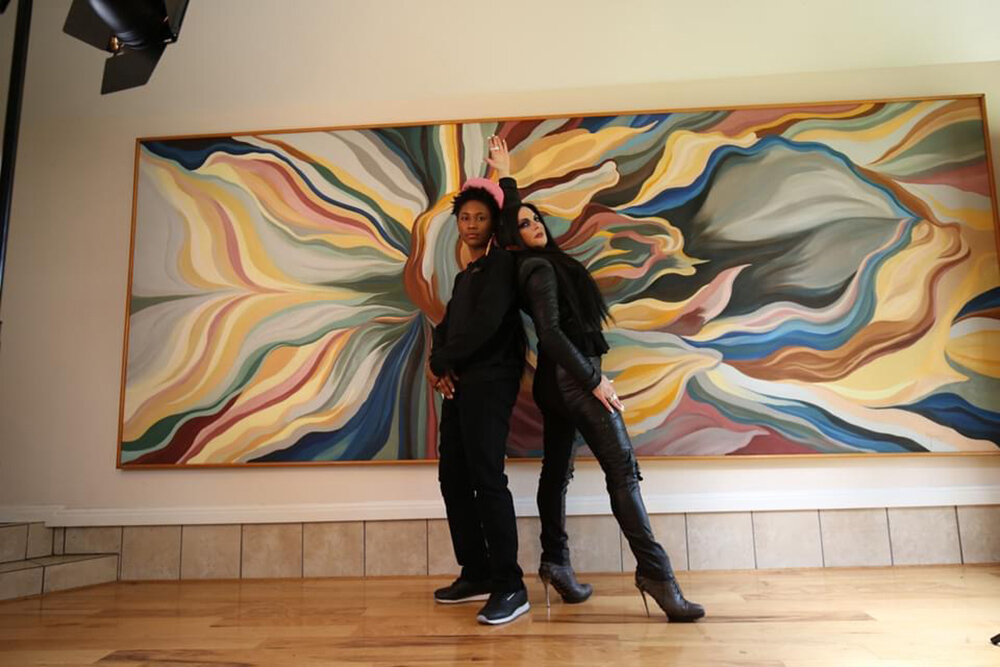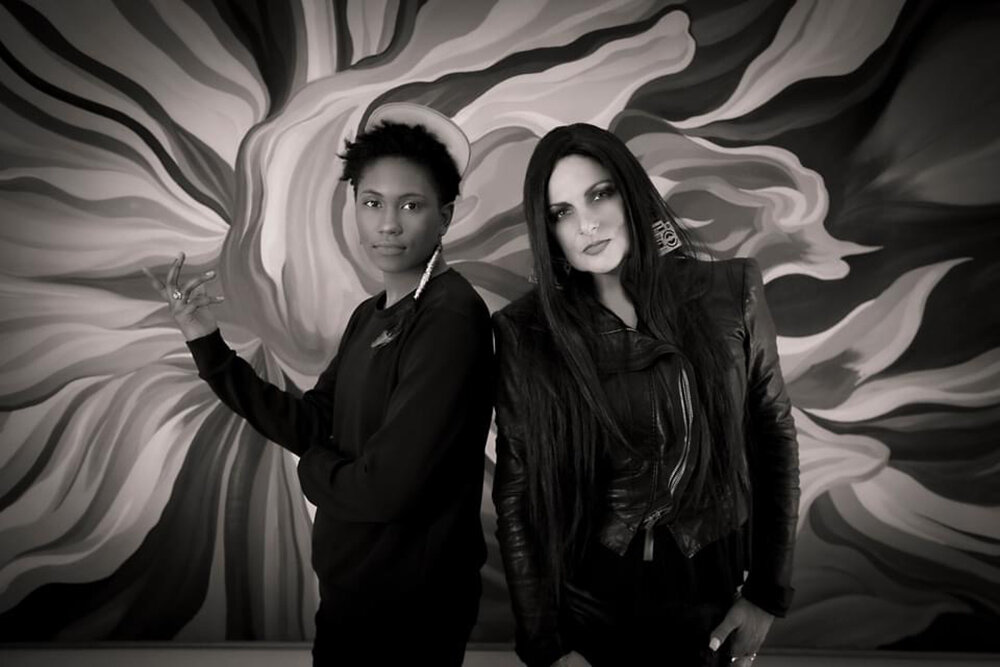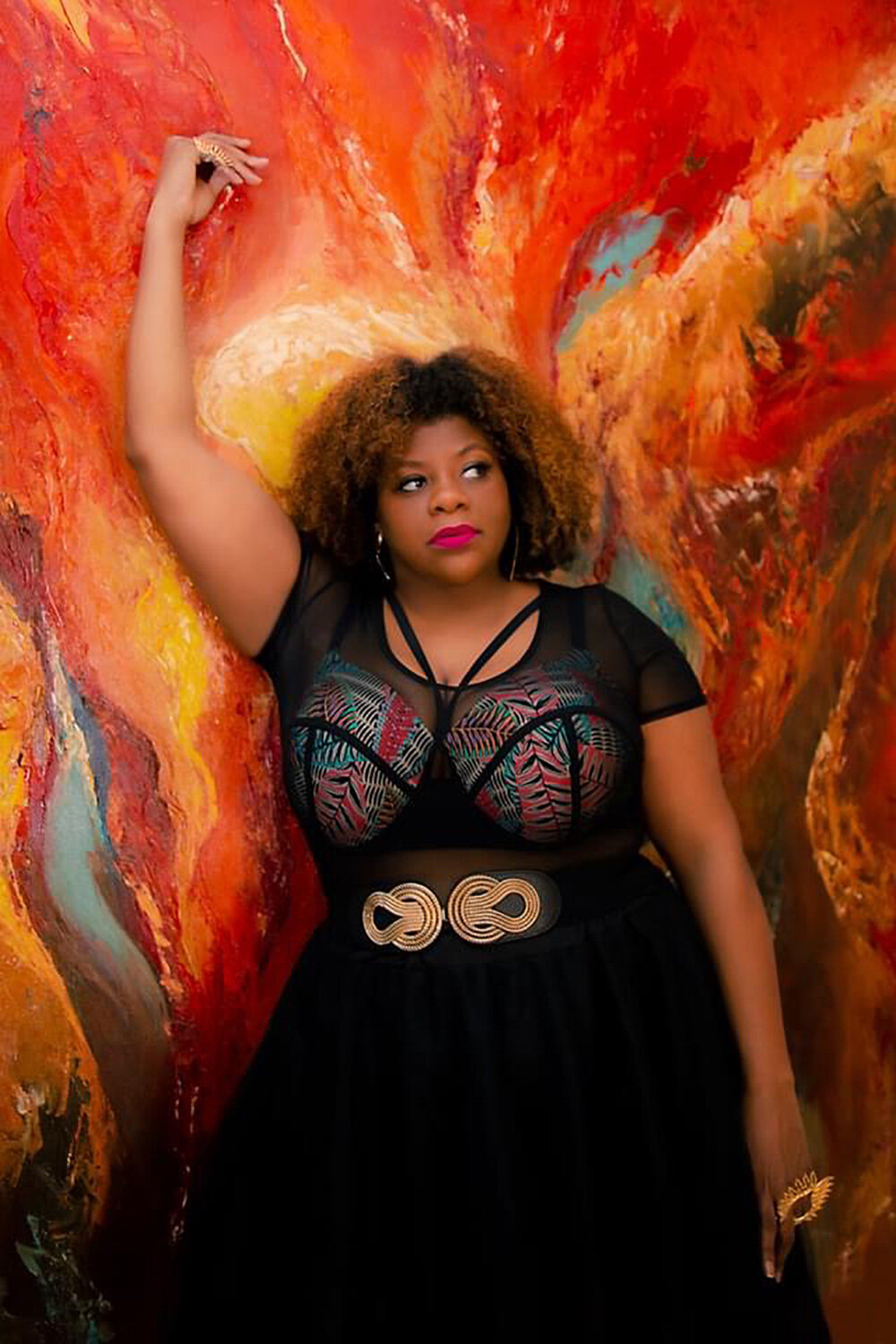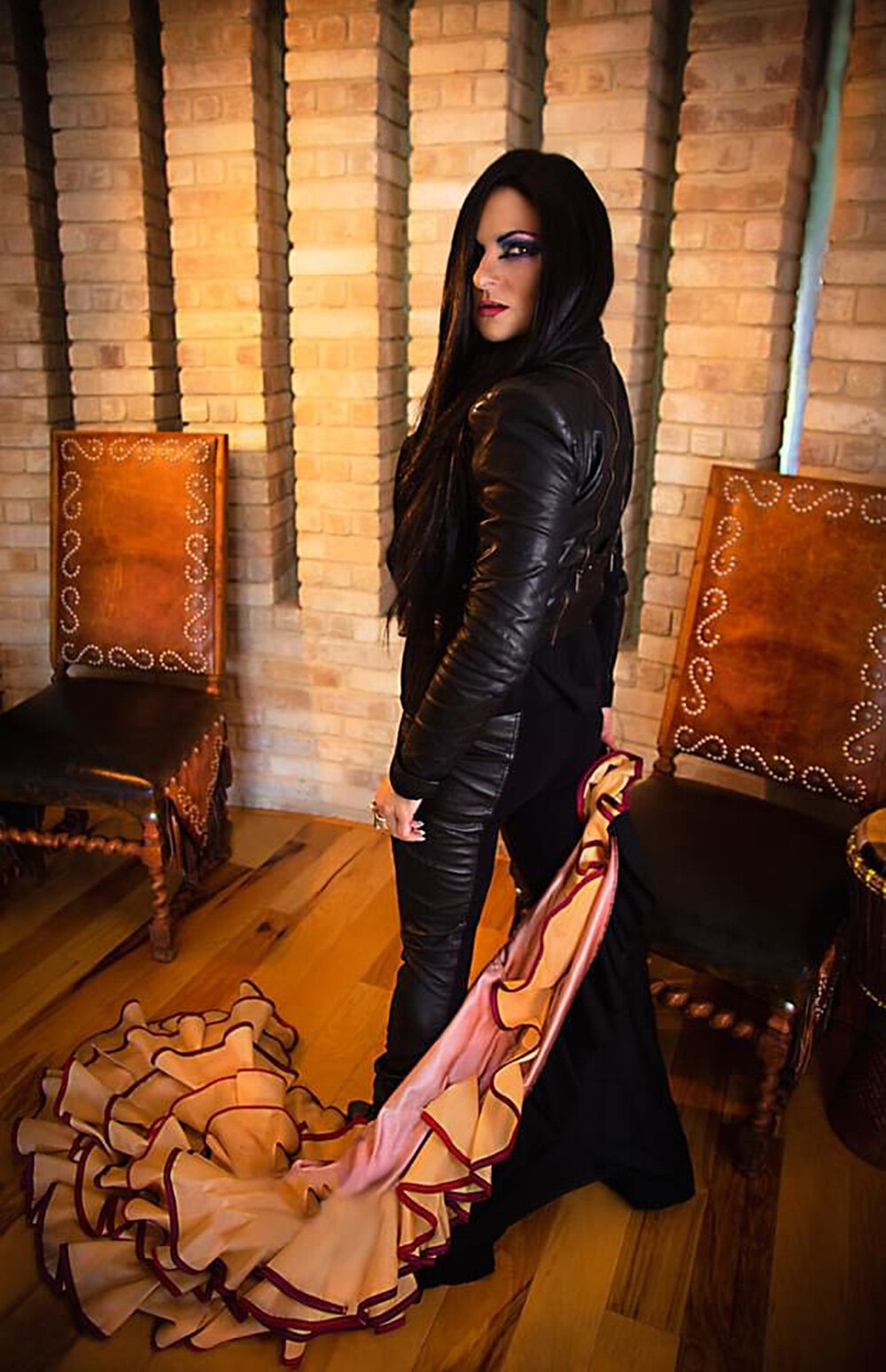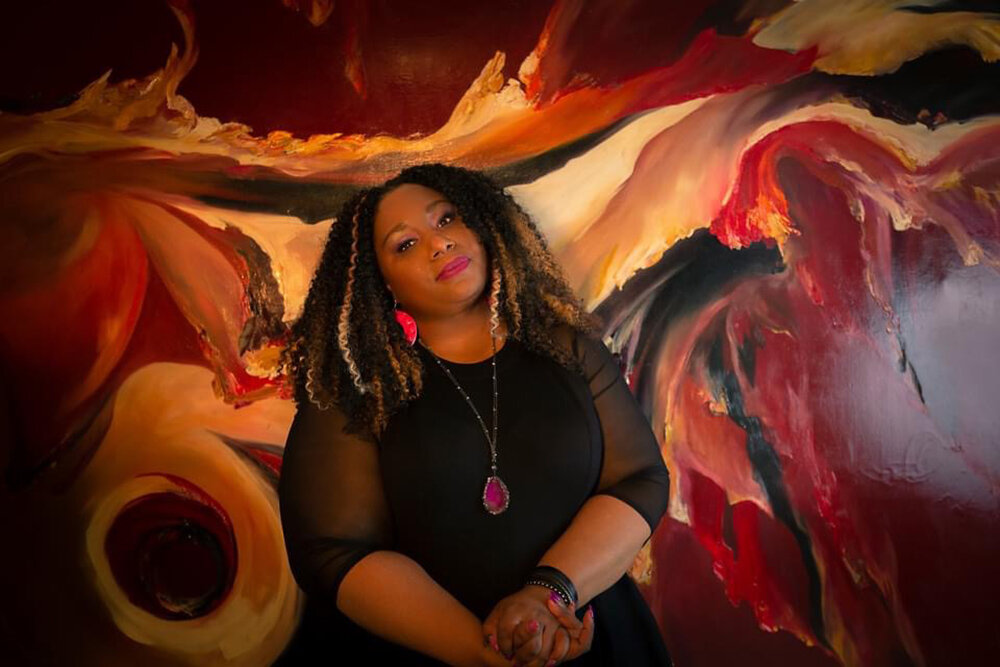Bad Mama Jama Remix: Let the Record Show Returns to Carver
March 19, 2021 - Downtown San Antonio
Bad Mama Jama Remix features a line-up of female artists including Andrea “Vocab” Sanderson, Glo Armmer, Naomi Sumthin2Say, Aminah Decé, Yvette Hardin, Tausha Jackson, Qween Paz Natalia, dancers Lisa Martinez and Tamara Adira, DJ Ms. Eclectic, as well as set designer and arts activist Beatriz “Triz” Rodriguez. Photos: Nicole Marie Moore.
By: Ricardo Delgado - Staff Intern, San Antonio Sentinel
Bad Mama Jama Remix: Let The Record Show revives previous incarnations with all the vulnerability, strength, pride and empowering blends of performative art forms of its predecessor and more.
The production previously ran in 2018 with themes of “identity, motherhood, sexuality, dreams, love and loss.” Tickets originally meant for the March 20 show, rescheduled from March 28 because of COVID-19, are sold out, with tickets from the previous date being honored.
Andrea “Vocab” Sanderson, San Antonio’s poet laureate and a singer, hip-hop artist and overall total artist views the production as a stage for women from all walks of life to showcase their vulnerabilities as strength. To her, having a space in the community for art and creativity to prosper in the community eases growth and healing.
“I describe it as women empowering other women through telling their stories, singing their songs, doing their dance and just bringing their creativity to the stage,” Sanderson said. “It's vulnerable in a lot of ways and raw in a lot of ways. I think it'll be emotional for the audience as well as the cast, because the first time we did the show, the cast was crying, the audience was crying. The guys who were doing the tech upstairs were crying. It got real for a lot of people.”
Like every facet of the world COVID-19 ravaged, Bad Mama Jama Remix adapted to the difficulties forced upon the performing arts. The venue, the Jo Long Theatre at the Carver Community Cultural Center, requires attendees to be spread out and wear masks at all times and have their temperatures taken before entering. Sanderson noted the intimacy required a new understanding of space, and the passion and celebrations around the production had to be curtailed, which required some getting used to.
The Remix showcases dance and song more than the previous iterations of the production, which focused on the monologues. The topics of the oeuvre still deal with experiences of women of color and are no less heavy or essential, Sanderson noted.
“We talk about health issues, and health crises and deciding whether to keep some of our reproductive system or give it up in order to save our own lives and our own cells through cancer and things of that nature,” Sanderson said. “Relationships between ourselves and other women and how [we] deal with that. Do we let a man or situation come between us or our love lives? All of these things we talk about in our monologues, or our poems and in our performance.”
Aminah Parham, also known as Aminah Decé, a cast member and visual consultant/graphic designer for the production, believes it is hard to find one specific message to highlight from Bad Mama Jama Remix since there is something for every perspective watching.
“It's difficult to say because each artist who is or each cast member who's presenting has their own journey and their own story that they're expressing,” Parham said. “Our messages may overlap, or they may be specific to that journey, and I think that's part of the beauty of the cast that Vocab put together because we can appeal to different audience members, and make sure that everyone is included.”
Sanderson is unafraid of complex topics getting lost in translation thanks to the “direct” storytelling in the art she and her castmates produce.
“I think the hardest part was living through the experience,” Sanderson said, laughing afterward.
Qween Paz Natalia, a dancer, producer, musician, singer and songwriter for the show brings a mix of indigenous and house music to the production. They believe both have the potential to be “visceral”, a sensation closely related to the themes of Bad Mama Jama Remix.
“I feel like for me - house music and listening to my own ancestors' music [can] make me feel that same way, ” Natalia said.
A song worked on by Natalia and Sanderson called “Jade Eyes” deals with jealousy and the insecurity behind it in the artistic community, a topic Natalia believes needs addressing.
“This is a great idea that we're talking about jealousy to these people, because I feel like we need to support each other more as an art community, as a music community,” Natalia said. “I think it's just genius that she already had this poem. I was eager to put this music together with that poem, and it just came out so great.”
Regarding the need for more stories for Black women in the mainstream, she believes there should be a platform in the arts and in entertainment for all perspectives.
“I don't care what walk of life they come from or what color their skin is, as long as people don't feel like their narrative is being silenced, or overlooked or disrespected so that they can get their story out clearly and have the space for it provided for them.”
Natalia thinks the directness of the message, as well as the source of the message, can help those struggling to find an identity like theirs in the arts.
“We're sharing the message that's just too direct to just ignore: 'drink water, read, be good, do your thing,’” Natalia said. “It's definitely beautiful that we have people that look like us, speaking to us the truth in a good message, and then having a new perspective, having beautiful instrumentation, [musical] push behind it - that's everything.”
The performative arts, to Sanderson, are not valued as much as other forms of expression or entertainment.
“I'm not gonna name theaters but there's some theaters, they will fly people from all over the globe, but there are people right here that have stories to tell. I feel like these theaters should feature those stories as well.”
“It's vulnerable in a lot of ways and raw in a lot of ways. I think it'll be emotional for the audience as well as the cast, because the first time we did the show, the cast was crying, the audience was crying. The guys who were doing the tech upstairs were crying. It got real for a lot of people.” - Andrea “Vocab” Sanderson
Bad Mama Jama Remix: Let the Record Show revives previous incarnations with all the vulnerability, strength, pride and empowering blends of performative art. Andrea “Vocab” Sanderson says the vulnerability of the show and the raw emotion are defining not only for audience members but for the cast as well. Photo: Nicole Marie Moore.
When asked why the focus on outsourcing inspiration and talent in San Antonio existed, Sanderson gave an answer as direct as her work.
“Colonialism, maybe,” Sanderson said before breaking into laughter. “Colonialism maybe there's, I mean there could be a lot of reasons. We value a lot of things; we think more finesse is lended to stories right outside the perimeters of our home city. Sometimes we don't value the things that are right in our own backyard.”
Sanderson believes the city could assist in giving artists more tools to market and network themselves in a public space, but also thinks artists can learn the ever-expanding set of skills needed on their own, like writing press releases.
“I think maybe the city could [benefit] from having some workshops and some clinics on how to conduct ourselves in an artistic world,” Sanderson said. “Everything you need to know is on YouTube. I'm dead serious about that, you can probably learn how to do an open heart surgery on YouTube. There's so many videos out there on how to produce your own content, how to use these apps that you might not know how to use.”
The struggle for artists encompasses financial issues as well as technical or publicity-related hurdles. Sanderson remembers venues charging $5 for “a whole decade, at least” and how it limited funds for studio sessions, videos and other artistic expenses. She appreciates San Antonio offering grants to artists during COVID-19, especially when performing during a pandemic incurred even more technological expenses.
Audience members can help with exposure as well, Sanderson emphasized, given the fleeting nature of some performance art and the licensing agreements surrounding it.
“I understand sometimes you're out, you see somebody playing, you're like, 'Oh, I'm gonna shoot a quick video with this,' and you don't even know the name of the artist you're watching,'” Sanderson said. “You might get up and keep on moving free for the rest of your day and not think anything of and just post it but, just mindfulness to share the stuff that you see people doing with them, would be helpful.”
Watching her friends struggle during COVID-19 with gig cancellations affected Sanderson, despite her own relative job security. Staying unified as a collective scene, through fundraisers or individual efforts is key to keeping a city’s culture thriving.
“I was giving to people's Patreon and their online concerts every single week,” Sanderson said.”I've given [friends] money so they can get their studio sessions done, people trying to get their books done. I've helped them with that, or doing features [or] collaborations with people for absolutely free. I know that I'm helping them with the stuff that they're doing and keeping resources. I do that stuff all the time I don't talk about it, but I just do it because it's very, very necessary.”
Outside of Bad Mama Jama Remix, Sanderson is enjoying her success as a recording artist, saying she enjoys recording “more than anything.”
“I am fascinated by that first playback after I've put something new down,” Sanderson said.
Poetry is still her main earner and “bread and butter”, but the status her talents bestowed allowed her to explore many artistic avenues.
“My life is just completely shifted because of poetry, it opened the door for my other gifts,” Sanderson said. “And so that scripture in the Bible, that 'your gift will make room for you', my gift of poetry, God just blessed me that it's made room for me in other capacities,”
Sanderson hopes the everyday grind most adults face can be soothed with art, no matter the source. She describes the current social climate as a “recovery”, where individuals need to explore what brings them joy.
”I just hope people really give themselves permission to love art as much as possible, and to not only celebrate it by viewing it but really participate themselves,” Sanderson said. “There's little things that we can do to express ourselves every day, whether it be gardening or crafting, or making up songs, [..] write a little ditty. Do something to help yourself get through whatever it is that you're going through just for the hell of it. [...] Keep showing up for the artistic community.”
Ricardo Delgado transferred to Texas State University at San Marcos to study journalism and minor in political science. He expects to graduate in the spring of 2021. Email him at reporter@sasentinel.com

